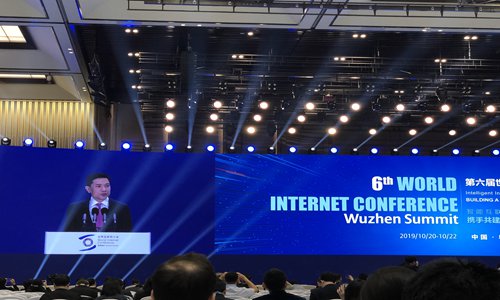HOME >> BUSINESS
Baidu CEO sees ‘smart economy’ as new champion of growth with boost by AI
By Chu Daye Source:Global Times Published: 2019/10/20 22:18:40

Robin Li Yanhong, co-founder and chief executive officer of Baidu, gives a keynote speech during the plenary session of the 6th World Internet Conference in the river town of Wuzhen, East China's Zhejiang Province on Sunday. Photo: Zhang Hongpei/GT
The boss of Baidu Inc, China's answer to Google, used the term "smart economy" at an internet summit in East China to emphasize that the growth focus of China's digital economy faces another turning point.
Robin Li Yanhong, the founder and CEO of Baidu, declared at the 6th World Internet Conference that the digital economy is now in phase four - a smart economy primarily driven by artificial intelligence (AI) technology.
According to Li, the first three phases of the digital economy in China are now valued at 31 trillion yuan ($4.38 trillion) and accounted for one-third of China's GDP as of the end of 2018. The three are the promulgation of the personal computer (PC), PC internet and mobile internet.
Identifying the features of the smart economy, Li said this new economic structure will inject the global economy with fresh impetus and will the key engine of global economic growth.
Analysts said this new "theory of evolution' comes from Baidu's years of investment and experiments in the AI sector.
This is the first time that Li, an ardent supporter of AI, has propounded such a notion, according to the Securities Times on Sunday.
At the Smart China Expo in Southwest China's Chongqing Municipality in August, the CEO envisioned a new world powered by AI and said Baidu would throw its whole weight into expediting the dawn of this new age.
On Sunday, Li said his company aims to transform itself into an AI platform company with a global leading position in the mid- to long-term.
Li also identified three changes to be seen in the smart economy: changes in how humans and machines interact, IT infrastructure, and new business forms. Li said Baidu invested heavily in the three sectors.
Yi Beichen, a veteran mobile internet observer, told the Global Times on Sunday that Chinese companies have in recent years made big strides and even secured world-leading positions, in a number of AI fields, from streaming and smart speakers to neural networks and logistics management.
"Corporate China has taken center stage in global internet development," Yi said.
Liu Dingding, a Beijing-based industry insider, told the Global Times on Sunday that Li's theory had its origins in a wide range of areas ranging from its Apollo autonomous-driving vehicle to improved efficiency at Beijing's steel mills.
According to the company's quarterly report, released in August, the Baidu is building a distribution channel that bridges smartphones, smart homes and automobiles.
Baidu was also among three technology companies to receive China's first batch of self-driving commercial licenses in September in Wuhan, capital of Central China's Hubei Province and a pilot city for autonomous driving.
Experts have in recent years argued that the smart economy may become the new source of future economic growth, due to its capacity to facilitate high-quality growth. The notion has also drawn away some of the attention previously given to the "internet plus" model.
Shenzhen, China's pioneering city for reform and opening up, declared in January that it will build a pilot zone featuring the smart economy.
Posted in: COMPANIES